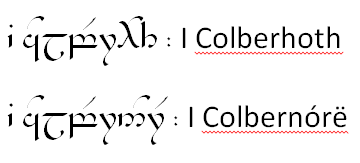The Colbert Report… Now in Elvish!
I was inpired this week by Hobbit Week on the Colbert Report to delve into some Elvish. To be more exact, I wanted to see if I could translate the following into Quenya or Sindarin or both:
- Stephen Colbert
- The Colbert Report
- Colbert Nation
I freely admit I’m no Helge Fauskanger or MÃ¥ns Björkman, but I figured I’d do my best to puzzle through these translations. Besides, it seemed like a nice little challenge. With that admission, I am more than happy to hear suggestions for better translations. (Note: I did use Björkman’s Tengwar Eldamar for the transliterations into Tengwar below.)
To begin with: The name “Stephen”. According to Quenya Lapseparma, “Stephen” can be translated as RÃno or RÃnon for “crowned”. It appears this word is attested in Sindarin, but it appears it could be a valid word in Quenya as well. So, we’re going with that.
“Colbert” was a little trickier. The easiest thing to do was to simply go phonetically and use Colber as the Elvish equivalent since he doesn’t pronounce the final -t. I did check and -lb- does seem to be a valid consonant cluster. However, I wanted to see if we could do a full Elvish. I then tried to look up the meaning of the surname. According to this and this, the name appears to mean something like “cool-bright” or “renowned, bright, famous.” Since “bright” seemed to come up in each, I decided to investigate that angle. It appears “brightest” is ancalima which many will remember from Aiya Eärendil Elenion Ancalima! “Hail Eärendil, brightest of stars!”. So, taking the masculine ending -o, I arrived at Ancalimo as the very rough equivalent of “Colbert” thus giving RÃno Ancalimo or RÃno Colber “Stephen Colbert”.
Next came: The Colbert Report. I had “Colbert” handled from the first step. “Report” turned out to be much more difficult. I used Fauskanger’s Quenya wordlist and the Sindarin glossary from Ambar Eldaron. There does not appear to be a word for “report” so I looked up some synonyms and found the following Elvish possibilities (Q = Quenya; S = Sindarin):
- quentalë “account, history” (Q)
- quentasta *”historical account”, “any particular arrangement (by some author) of a series of records or evidences into a given historical account” (Q)
- menta “message, sending” (Q)
- canwa “announcement, order” (Q)
- siniath “tidings, news” (S)
- trenarn “tale, account” (S)
Lots of possibilities, but I decided on quentasta for the Quenya and siniath for the Sindarin: Quentasta since it involves an author (in this case, RÃno Colber) who arranges a series of records or accounts (on the show); siniath since “tidings” and “news” are pretty close to “report” at least in the sense of Colbert’s show. With that, I could now form:
I Siniath Colber “The Colbert News” (Sindarin)
I Quentasta Colberwa “The Account of Colbert” (Quenya)
I like the Quenya since both primary words end in a vowel the same way that “The Colbert Report” end in the -r sound. Of course, I could also use I Siniath Ancalimo and I Quentasta Ancalimova. Somehow, I like the Colber better.
Finally: Colbert Nation. This one had to use Colber so that was a given. The Quenya word nórë was tailor-made for this since it means “a land associated with a particular people”: I Colbernórë! However, The Colbert Nation is known to be a rowdy bunch, so I hopped over to Sindarin to find hoth as in the Glamhoth “The Yelling Horde” (orcs). Hoth has to do with a horde or host of people, so a Sindarin Colbert Nation seems to me to be better named I Colberhoth “The Colbert Horde!”
That’s my attempt! It was fun and hopefully somewhat correct 🙂
It is so refreshing to see someone revel in their Tolkien geekitude on television. As the audience says on The Colbert Report almost every night:
STEPHEN! STEPHEN! STEPHEN!… or wait, I guess that should be…
RÃNO! RÃNO! RÃNO! RÃNO!


